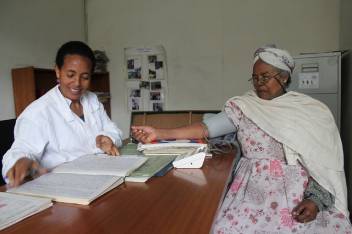 Youth engagement was the flavour of this year’s European Development Days (EDDs) conference, echoing the theme of the European Year of Development.
Youth engagement was the flavour of this year’s European Development Days (EDDs) conference, echoing the theme of the European Year of Development.
But despite the clear importance of involving young people, our rapidly ageing global population means that a focus on youth alone will not meet the scale or the complexity of the development challenge.
Four representatives of the HelpAge network attended the conference to ensure that the contributions and needs of women and men of all ages were addressed, and that global population ageing did not fall completely off the agenda.
Absence of ageing
The two-day event included a wide range of larger plenary events and smaller panel events, debates and workshops. It involved senior government officials from both northern and southern countries, NGOs, parliamentarians, and EU officials.
Initial concern made way for hope as we saw signs that global population ageing, although still by no means a priority, is making its way into the sidelines of development discussions.
There is resistance. In many of the sessions, the issue of ageing was notable only by its absence, far from being recognised as one of the key trends affecting development. Often there was only silence in response to our queries about how global ageing is being or will be addressed.
Health and older people
In a session about health, a representative of the World Health Organization made a comment about the need to focus solely on youth in certain regions. We reminded her that “leaving no one behind” means investing in people at all stages of their lives, and that her own organisation is leading on some important work to ensure this happens.
However, by the end of the event we had witnessed several unprompted comments and several more prompted ones about older people’s rights, chronic disease, the obstacles that older people face in accessing essential services, and the importance of social protection.
Highlights of the event from an ageing perspective were the President of Luxemburg Xavier Bettel proclaiming that older people have “the right to live in dignity”, Ignacio Saiz of the Centre for Economic and Social Development putting forward a compelling case for strengthening older people’s rights, and the Deputy General Secretary of the International Trade Union Confederation making the link between decent work, ageing populations and social protection.
Meanwhile, Datuk Khaw Lake Tee of the Human Rights Commission in Malaysia reiterated that we “do not lose our rights as we age”, and that yet all too often we fail to see older people as rights-holders.
Older women excluded
We were glad to see gender issues raised throughout, although often the discussion revolved exclusively around women of reproductive age.
We took the opportunity to remind panellists and delegates of their obligation to include older women in attempts to eradicate gender equality. In a session on access to water and sanitation, WaterAid’s equity, inclusion and rights advisor Jane Wilbur spoke passionately against the exclusion and abuse of older women.
She said: “If a woman in a rural area is older or has a disability, she is even more likely to be attacked while she is trying to access water or toilets.”
Older women and men are still far from prominent in the minds of leaders and activists on international development, but it is heartening to hear individuals from outside of the HelpAge network recognising the importance of global population ageing and the urgent need for a response.
What remains is for those already talking about older people to join us in taking action; and hopefully older people and ageing will be part of the bigger conversation in next year’s EDDs.
Read more about our work influencing the European Union to support older people around the world.
